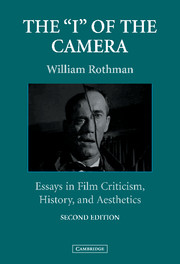Book contents
- Frontmatter
- Contents
- Foreword to the Second Edition
- Preface to the First Edition
- Acknowledgments
- Notes on the Essays
- The “I” of the camera
- 1 Hollywood Reconsidered: Reflections on the Classical American Cinema
- 2 D. W. Griffith and the Birth of the Movies
- 3 Judith of Bethulia
- 4 True Heart Griffith
- 5 The Ending of City Lights
- 6 The Goddess: Reflections on Melodrama East and West
- 7 Red Dust: The Erotic Screen Image
- 8 Virtue and Villainy in the Face of the Camera
- 9 Pathos and Transfiguration in the Face of the Camera: A Reading of Stella Dallas
- 10 Viewing the World in Black and White: Race and the Melodrama of the Unknown Woman
- 11 Howard Hawks and Bringing Up Baby
- 12 The Filmmaker in the Film: Octave and the Rules of Renoir's Game
- 13 Stagecoach and the Quest for Selfhood
- 14 To Have and Have Not Adapted a Film from a Novel
- 15 Hollywood and the Rise of Suburbia
- 16 Nobody's Perfect: Billy Wilder and the Postwar American Cinema
- 17 The River
- 18 Vertigo: The Unknown Woman in Hitchcock
- 19 North by Northwest: Hitchcock's Monument to the Hitchcock Film
- 20 The Villain in Hitchcock: “Does He Look Like a ‘Wrong One’ to You?”
- 21 Thoughts on Hitchcock's Authorship
- 22 Eternal Véritées: Cinema-Vérité and Classical Cinema
- 23 Visconti's Death in Venice
- 24 Alfred Guzzetti's Family Portrait Sittings
- 25 The Taste for Beauty: Eric Rohmer's Writings on Film
- 26 Tale of Winter: Philosophical Thought in the Films of Eric Rohmer
- 27 The “New Latin American Cinema”
- 28 Violence and Film
- 29 What Is American about American Film Study?
- Index
13 - Stagecoach and the Quest for Selfhood
Published online by Cambridge University Press: 05 June 2012
- Frontmatter
- Contents
- Foreword to the Second Edition
- Preface to the First Edition
- Acknowledgments
- Notes on the Essays
- The “I” of the camera
- 1 Hollywood Reconsidered: Reflections on the Classical American Cinema
- 2 D. W. Griffith and the Birth of the Movies
- 3 Judith of Bethulia
- 4 True Heart Griffith
- 5 The Ending of City Lights
- 6 The Goddess: Reflections on Melodrama East and West
- 7 Red Dust: The Erotic Screen Image
- 8 Virtue and Villainy in the Face of the Camera
- 9 Pathos and Transfiguration in the Face of the Camera: A Reading of Stella Dallas
- 10 Viewing the World in Black and White: Race and the Melodrama of the Unknown Woman
- 11 Howard Hawks and Bringing Up Baby
- 12 The Filmmaker in the Film: Octave and the Rules of Renoir's Game
- 13 Stagecoach and the Quest for Selfhood
- 14 To Have and Have Not Adapted a Film from a Novel
- 15 Hollywood and the Rise of Suburbia
- 16 Nobody's Perfect: Billy Wilder and the Postwar American Cinema
- 17 The River
- 18 Vertigo: The Unknown Woman in Hitchcock
- 19 North by Northwest: Hitchcock's Monument to the Hitchcock Film
- 20 The Villain in Hitchcock: “Does He Look Like a ‘Wrong One’ to You?”
- 21 Thoughts on Hitchcock's Authorship
- 22 Eternal Véritées: Cinema-Vérité and Classical Cinema
- 23 Visconti's Death in Venice
- 24 Alfred Guzzetti's Family Portrait Sittings
- 25 The Taste for Beauty: Eric Rohmer's Writings on Film
- 26 Tale of Winter: Philosophical Thought in the Films of Eric Rohmer
- 27 The “New Latin American Cinema”
- 28 Violence and Film
- 29 What Is American about American Film Study?
- Index
Summary
Stagecoach (1939), in its day, was more often characterized as a melodrama than as a western. It is true that what we might call the salvation of a woman and the formation of a romantic couple are central to its narrative. Yet on the whole the roles of women in Stagecoach, and in John Ford's films in general, seem more conventional than in the Hollywood movies of the 1930s and 1940s that Stanley Cavell has dubbed “comedies of remarriage” and “melodramas of the unknown woman.” In the course of Stagecoach, not one but two women achieve a new perspective. However, neither Dallas nor Lucy has much in common with the heroines of such films as The Philadelphia Story or Now, Voyager, women who are passionately committed to their quests for selfhood. The leading “classical” genres embrace an Emersonian philosophical perspective. Ford's cinema, like Hitchcock's, stands in an uneasy relationship to that philosophy.
Stagecoach seems to have more to do with such matters as social class and prejudice. On those matters, the film judges American society – “civilization” – to be wanting. In the end, when Curly (allied with Doc) subverts the rule of Law he is sworn to uphold, Dallas and Ringo are free to settle down on his ranch – but only south of the border, in Mexico, a place outside “civilization,” to which they will never be free to return.
What does Dallas want? She wants to be a mother, for one thing. And she wants Ringo.
- Type
- Chapter
- Information
- The 'I' of the CameraEssays in Film Criticism, History, and Aesthetics, pp. 139 - 157Publisher: Cambridge University PressPrint publication year: 2003



